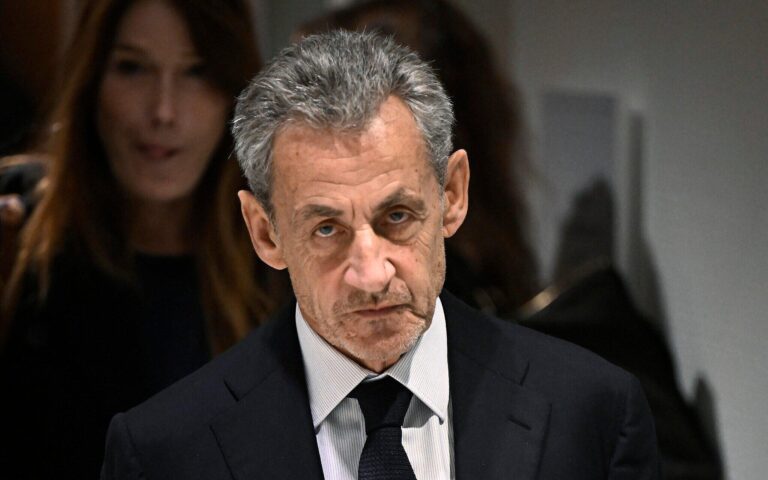Former French President Nicolas Sarkozy was sentenced to five years in prison, with three years suspended, marking a dramatic fall from grace for the once-powerful leader. The conviction, announced by a Paris court, stems from charges of corruption and influence peddling, a verdict that has sent shockwaves through French political circles. Sarkozy, who served as president from 2007 to 2012, becomes one of France’s highest-profile politicians to be handed a prison term, highlighting ongoing efforts to hold public officials accountable for abuses of power. This landmark ruling has sparked widespread discussion about political transparency and ethical governance in France.
Former French President Sarkozy Sentenced to Five Years in Corruption Case
In a landmark verdict that marks a dramatic fall from grace for one of France’s most prominent political figures, Nicolas Sarkozy has been sentenced to five years in prison, three of which are to be served behind bars. The ruling comes after he was found guilty of attempting to bribe a judge and abusing his influence to gain inside information about an ongoing investigation. The sentence reflects a firm stance from French courts on political corruption, underscoring a growing intolerance for abuses of power at the highest levels of government.
Sarkozy’s defense team has announced plans to appeal the verdict, signaling that the legal battle is far from over. The case has also stirred widespread debate across France about political ethics and accountability. Key elements of the trial included:
- Evidence drawn from wiretaps revealing secret communications with a magistrate.
- Allegations tied to misinformation and inappropriate influence peddling.
- Public reaction split between condemnation and staunch support.
| Aspect | Detail |
|---|---|
| Sentence Duration | 5 years (3 in prison) |
| Charge | Corruption and influence peddling |
| Next Steps | Appeal planned by defense |
Legal Implications and Political Impact of Sarkozy’s Conviction
The unprecedented conviction of former French President Nicolas Sarkozy marks a profound moment in the country’s political and judicial history. The 5-year jail sentence, with three years suspended, reflects the judiciary’s firm stance on corruption and financial misconduct at the highest echelons of power. Legally, this ruling sets a critical precedent, underscoring that no individual, regardless of their former status, is above the law. Analysts suggest this decision may prompt a wave of legal reforms aimed at strengthening transparency and accountability mechanisms within French political institutions.
Politically, the fallout from Sarkozy’s conviction is multifaceted. It has reignited debates within France regarding the ethical boundaries of political campaigning and the integrity of public officials. Key implications include:
- Shift in public trust: The conviction erodes confidence in traditional political elites and fuels calls for greater citizen oversight.
- Impact on conservative parties: Sarkozy’s center-right allies face internal upheaval as they navigate distancing themselves from the scandal.
- Boost for opposition factions: Left-wing and populist parties are capitalizing on the conviction to argue for systemic change.
| Aspect | Political Effect |
|---|---|
| Public Perception | Increased skepticism toward politicians |
| Party Dynamics | Internal strife in conservative factions |
| Election Outlook | Potential advantage for opposition groups |
Reactions from French Political Circles and International Observers
Reactions within French political spheres were swift and charged with a mixture of shock and reflection. Key figures from both ends of the political spectrum voiced their opinions:
- Emmanuel Macron expressed concern over the implications for the integrity of French politics, emphasizing the importance of justice irrespective of status.
- Marine Le Pen called the verdict a “moment of reckoning,” urging for transparency and reforms in political financing.
- François Hollande, Sarkozy’s predecessor, remarked on the case as a reminder of the burdens carried by public office and the need for accountability.
International reactions highlighted the wider impact of the ruling on global perceptions of political ethics and governance. Observers noted how the conviction sets a precedent in Europe’s legal approach to corruption among high-profile leaders:
| Region | Reaction |
|---|---|
| European Union | Seen as a strong message supporting judicial independence and anti-corruption efforts. |
| United States | Mixed views with emphasis on the importance of transparent democracies worldwide. |
| Asia | Scholars noted growing scrutiny of political financing mechanisms amid democratic reforms. |
Recommendations for Strengthening Anti-Corruption Measures in France
To deter future cases resembling the high-profile conviction of former President Sarkozy, several key strategies must be prioritized. First, enhancing transparency in political financing and government contracts is critical. This can be achieved through rigorous audits, mandatory public disclosure of assets by elected officials, and real-time tracking of campaign contributions using digital platforms. Such openness enables public scrutiny and discourages illicit dealings behind closed doors.
Additionally, bolstering the independence and resources of judicial bodies tasked with investigating corruption should be a cornerstone of reform efforts. This includes:
- Expanding special anti-corruption prosecution units with dedicated anti-bribery experts.
- Strengthening whistleblower protection laws to encourage insiders to come forward without fear of retaliation.
- Implementing periodic training programs for law enforcement on emerging trends in political corruption.
Below is a brief overview of suggested measures and their potential impact:
| Measure | Expected Benefit |
|---|---|
| Real-time public financing disclosure | Increased accountability and reduced illicit funding |
| Strengthened whistleblower protections | Higher reporting rates of corruption |
| Specialized anti-corruption units | More effective legal proceedings and convictions |
Insights and Conclusions
The sentencing of former French President Nicolas Sarkozy to five years in prison marks a significant chapter in the country’s ongoing reckoning with political corruption. As one of France’s most prominent leaders faces incarceration, the ruling underscores the judiciary’s commitment to accountability, regardless of status. The case is expected to reverberate through French politics, prompting renewed debates about transparency and ethics in public office. Further developments and potential appeals will be closely monitored both in France and internationally.




